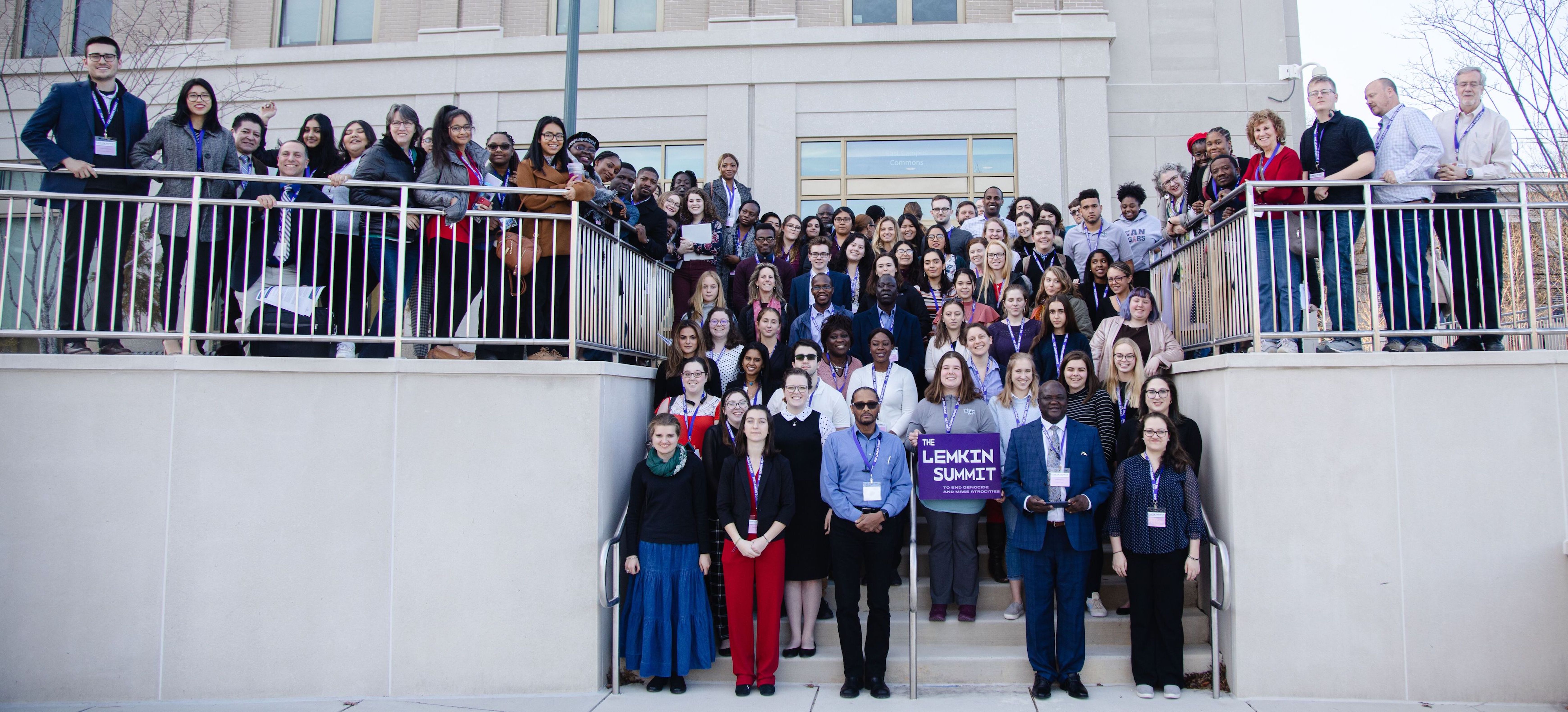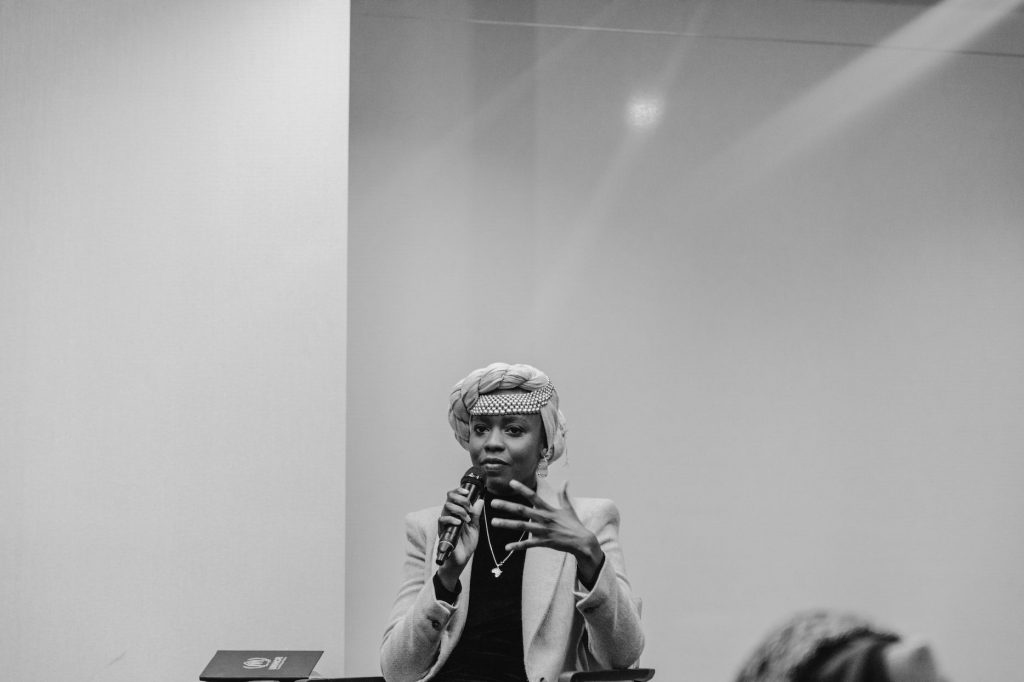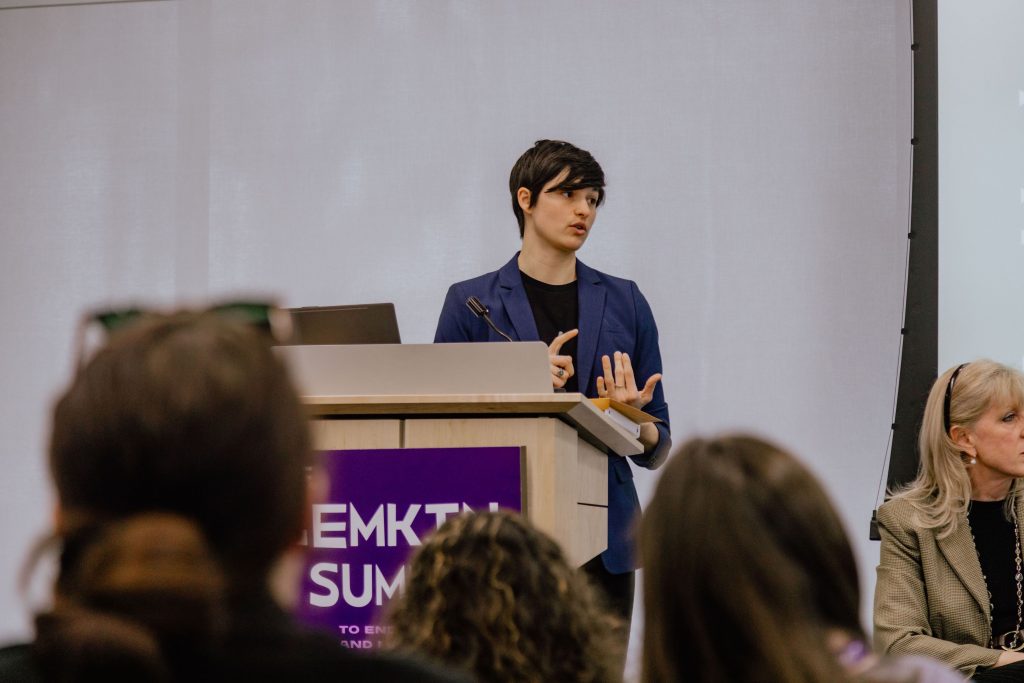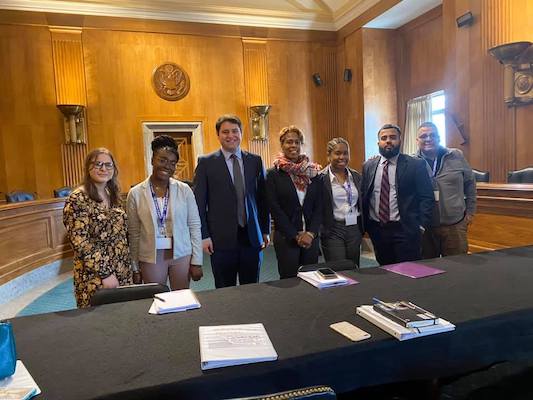
The 2020 Lemkin Summit attendees. All photos courtesy of Anthony Bongungu @ABongungu
2020 marked the fifth year of the Lemkin Summit to End Genocide and Mass Atrocities. The Sentry’s annual Summit, hosted and co-sponsored by American University’s Ethics, Peace, and Human Rights Program, brought together 150 activists and student leaders seeking to combat genocide and mass atrocities. Representing 48 colleges and universities, 9 high schools, and 19 organizations, participants came from 27 US states, including Washington DC, as well as from Canada, the United Kingdom, Australia, The Netherlands, South Africa, Rwanda, Congo, and South Sudan.
The three-day Summit featured expert panels, activist skills trainings, and focused breakout sessions. Throughout the event, participants networked with one another, engaged with guest speakers, and learned new approaches to preventing and ending mass atrocities. Special focus was given to the use of policy instruments that target the illicit financial flows of war criminals as a means of providing real leverage to revitalized peace processes and strategic human rights advocacy in places such as the Democratic Republic of Congo (Congo), South Sudan, and Sudan.
The Summit opened on Saturday with the presentation “Kleptocracy and Captured States” which explored how control of the apparatus of the state can be used to engage in grand corruption. Participants then heard from several speakers, including John Prendergast, Founding Director of the Enough Project, Co-Founder of The Sentry, and Strategic Director of the Clooney Foundation for Justice. During his talk, “Stories of Change and Transformation”, Prendergast recounted various inspiring stories from his personal life and professional career. The day ended with an emotional and graceful performance by Darfuri activist, poet, and author, Emi Mahmoud. During the 2018 Lemkin Summit, Mahmoud shot a video for participants as she embarked on a “One Girl Walk” across Sudan with the goal of inspiring peace, harmony, and connection in her increasingly fragmented country. Through her activism, Mahmoud aimed to use poetry to “approach collaboration in a way that evokes compassion and not discord; a way that inspires hope.” Two years later, after an inspiring revolution in Sudan, her home country, her performance at the 2020 Lemkin Summit was a symbolic and a powerful way to end the day.
“The experience for my students was priceless. Not only did they learn about important global issues, meet a wonderful diverse group of passionate people, they spoke eloquently, intelligently, and are cogs in the wheel for human rights!” – Debra Maller, Teacher – Rahway High School

Speaker Emi Mahmoud, Darfuri activist, poet, and author, brings the first day of the summit to a close.
Sunday’s program featured breakout sessions that explored the ongoing transitions and current developments in Sudan, South Sudan, and Congo, as well as a compelling session on “Understanding Open Source Investigations.”
Sunday also featured a discussion with Samantha Power, the 28th US Permanent Representative to the United Nations and a member of President Obama’s cabinet. Power is the Anna Lindh Professor of the Practice of Global Leadership and Public Policy at Harvard Kennedy School and the William D. Zabel Professor of Practice in Human Rights at Harvard Law School. She spoke, among other topics, about “The Education of an Idealist,” her recently authored memoir, in which she offers an urgent response to the question, “What can one person do?” Power also called for a clearer eye, a kinder heart, and a more open and civil hand in our politics and daily lives.
“This conference has provided me with so many eye-opening experiences and has taught me so much about things I knew little to nothing about before. In just two years of attending, the Lemkin Summit has played such a crucial role in shaping the direction of my life and career path, as it has taught me and shown me things that I physically cannot divert my attention from. So thank you all, for teaching me what we should all really be fighting for in this world.” – Benjamin Drinkwater, a student at Boston University

The Sentry’s Sophie Lombardo and Debra LaPrevotte kick off the Summit with their opening session Saturday.
The Summit culminated with almost 100 constituent meetings on Capitol Hill in which participants met with Representatives’ and Senators’ offices to advocate for:
- Increasing the capacity for the US Department of the Treasury to focus on sanctions programs related to Africa, as they had done in the previous appropriations cycle. Increased funding at the Treasury Department in these areas will help address the root causes of instability, such as corruption and human rights violations, ensure that US diplomats have the leverage they need when working to address conflict and human rights abuses, and bolster the effectiveness, impact, and enforcement of these sanctions programs.
- Urging Senators to co-sponsor the Improving Laundering Laws and Increasing Comprehensive Information Tracking of Criminal Activity in Shell Holdings Act (ILLICIT CASH Act, S. 2563) to end the use of anonymous shell companies in the United States by requiring the disclosure of a company’s beneficial owners. Anonymous companies can be used to evade sanctions and help kleptocrats launder the proceeds of corruption. Unfortunately, the United States is one of the easiest places in the world to establish an anonymous company. In fact, in most states, it requires less identification to open a business than it does to get a library card. Passing this bill will not only help to ensure the United States financial system is not being used by international money laundering schemes, but it will also strengthen the effectiveness of financial tools, such as sanctions and anti-money laundering measures, and will assist law enforcement in addressing international corruption.
- Supporting the renewal of the congressional caucus on Sudan and South Sudan and committing to active participation, ensuring that an organized presence on Capitol Hill will help Sudan and South Sudan to remain priorities.
As almost 150 passionate activists roamed the halls of the Capitol, raising their voices and developing relationships with congressional offices, the 2020 Lemkin Summit proved that as long as you have a voice, you can make a difference, no matter where you came from or what language you speak.
“To the wrongs that need resistance, to the right that needs assistance, to the future in the distance, give yourselves.” – Carrie Chapman Catt

Lemkin participants complete their Summit experience with a lobby day on Capitol Hill.
“Growing up in Tongogara Refugee Camp, in Zimbabwe, I found hope in the phrase: They took away my home, but they cannot take away my future. It took a ‘village’ to get me to where I am, experiencing a brighter future. Thank you for being the ‘village’ for countless others in Africa and for inviting me to be part of the movement.
For a long time, I hardly did much to advocate for displaced and voiceless refugees around the world, especially in Africa. Partly was because I lacked the toolset and felt ‘small’ going against the kleptocrats. I am grateful for the platform, the training, the network, and valuable information the Lemkin Summit provided. I now have a valuable toolbox to use, and I don’t feel ‘small’ anymore.” – Jean Marie Uwimana, a survivor of the Rwandan Genocide.

